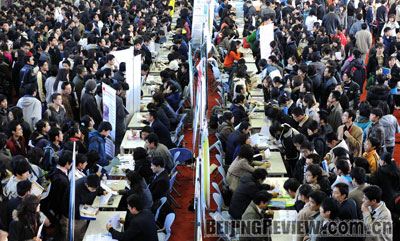|
 |
|
STRONG COMPETITION: Graduates pack into a job fair at Tianjin University of Science and Technology on November 28 last year (LIU HAIFENG) |
Yang Wei, a senior economics major from Tsinghua University, faces a dilemma. In October 2008 he received a call from his new employer, a U.S. investment bank, saying he would have to find another job or wait a year to start, because of the global economic situation.
"It happened all of a sudden, and now I worry about my future," said Yang. "I know the financial crisis is very serious, but I didn't think it could affect a job that I was already offered over a year ago. This never happened to former graduates as far as I know."
Yang made a plan to work for an investment bank in early 2008 and was offered the job in October the same year. "That is quite early for an offer as a senior student, but I didn't look for other opportunities since it was my ideal position," he said.
Li Yan, Yang's classmate, planned to find a job in a bank or financial company, but changed her career direction after hearing stories from friends. They said the financial companies are laying people off and cutting wages as the sector faces a growing crisis. Hearing of the turmoil Li, changed her plans to apply for government jobs.
Stable job
Many college students share Li's opinion. There are about 6 million graduates all over China and in 2008 more than one million applied for China's yearly civil servant recruitment exam, 200,000 more than in 2007. Millions of visitors to the civil service website caused a crash.
A survey, conducted by China Youth Daily recently on website portal Netease.com, showed around 86 percent of the 2,440 participants polled considered taking the civil service exam. Only 8 percent said they had not thought of applying for it. The average admission ratio for the exam rose from 1 in 60 in 2007 to 1 in 78 last year.
According to Hu Fengling, a professor at the University of International Relations, Beijing, at least 70 percent of graduates from his university will take the exam. Many students now admit that since the beginning of the financial crisis, career stability tops their concerns.
In past years, students with job offers from investment banks or international commercial banks were envied by their peers. This year, having realized the weakness of the banking sector, many students question the stability of such positions.
For Lin Shu, a graduate of Peking University, a civil service job is number one on her wish list.
"As a girl, I just want stability. If you work for a foreign company, you still face the risk of being laid off," she said.
Adjusting expectations
China will recruit 13,566 civil servants this year, a small fraction compared with the number of applicants. Most applicants will join the hoards of others on the job market.
Kui Hu, an insurance graduate from Tianjin-based Nankai University, has scaled down his expectations.
"Before looking for a job, I had high expectations, but I found it was difficult to realize them. Now, I don't mind a job with a lower salary as long as it's good for self- improvement."
Sun Lijian, a professor with Fudan University in Shanghai, suggests job seekers integrate their expectations with the country's recent stimulus plan.
| 